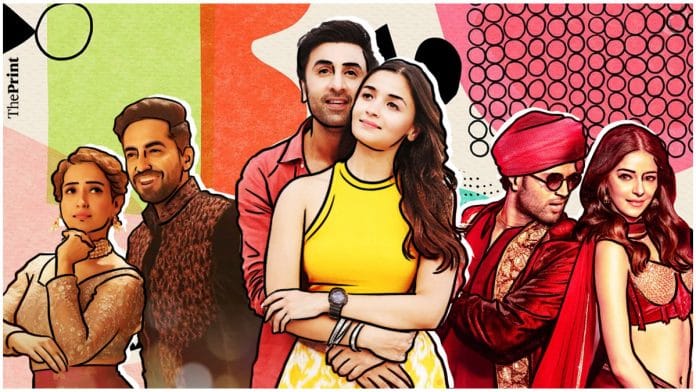If Bollywood’s latest attempts at painting a picture of love and yearning could be described in one word, then ‘cringeworthy’ will have the most takers. There are also other words that work equally well—illogical, unnecessary, and lazy. One wonders how the Hindi film industry, once guilty of encouraging many hopeless romantics, lost its heart.
Take the latest underwhelming offerings of Bollywood — Ayan Mukherji’s Brahmastra. Mukherji worked on his ‘magnum opus’ for 10 years just to make us laugh at it. The film would have us believe that Isha (Alia Bhatt) is some kind of a ‘love button’ who switches on the superpowers of Shiva (Ranbir Kapoor), but it spends no time making them fall in love.
It is not difficult to understand why most Bollywood movies force a love angle in every story like a potato in perfectly good biryani. Love sells. And it is easier to peddle familiar, stale romance than make a genuine effort to give the audience something meaningful. A love story is one thing, but to use an inexplicable, unrelated romantic subplot to drive the narrative forward till the climax is a whole other thing. Kedarnath (2018), Simmba (2018), Aarakshan (2011), even action, social films and almost every Akshay Kumar movie in the last decade —there’s an unnecessary romantic subplot.
Amit Ravindernath Sharma’s Badhaai Ho (2018) was welcomed with open arms. It was heartwarming to watch Neena Gupta and Gajraj Rao just looking at each other. They remained grounded yet childlike towards each other, a rare spectacle of authenticity in Hindi cinema these days. But the film needed ‘young love’ to ease the unconventional, so we also had to tolerate Ayushmann Khurrana and Sanya Malhotra’s pointless romance.
In 2022, the Hindi film industry has roughly released more than 70 films, and none of them were acclaimed as a great love story. The sad part is, most of these films toyed with the love angle in a way that made us say—please, don’t. What was Vaani Kapoor trying to do in Aditya Chopra’s Shamshera (2022)? How much does Puri Jagannadh hate women to write Ananya Panday’s character in Liger (2022)? Why did Shreya Dhanwanthary hook up with Dulquer Salmaan in Chup (2022) if she could just be a gifted film critic who understood the villain? Why was Jeetu playing a romantic fool in Jaadugar (2022) if it didn’t help the film at all? For female characters, we either get stylish feminist ‘sheroes’ or porcelain dolls glued to the male protagonist like bats. As if love either makes people lose their identity or make them puffy street fighters.
Barring Amazon Prime Video’s Gehraiyaan (2022) and Red Chillies Entertainment’s Love Hostel (2022), love remained an unwanted subplot in films.
Also read: Long before Mahsa Amini, Iranian cinema has fought hijab in small rebellions
Stuff of dreams
Two movies that I often think about are Ashutosh Gowarikar’s Jodhaa Akhbar (2008) and Mani Ratnam’s Guru (2007). While one is a love story, the other is about the rise of a business tycoon. Despite its flaws, Jodhaa Akbar is memorable for its aesthetic frames, larger-than-life scenes, and, most importantly, the chemistry between Aishwarya Rai and Hrithik Roshan. Guru didn’t need to show the lovers’ quarrel, the pain of separation, and the joy of meeting again, but it did and how. In both films, love had A R Rahman’s music to stew in and dance around.
Even Deepika Padukone in Shoojit Sircar’s Piku (2015) didn’t need to share glances with Irrfan Khan, but the latter made it moving. That was the decade when Bollywood showed that romantic subplots weren’t wasteful. Now, it seems to have run out of ideas. Regurgitating the same narrative does not work anymore. Movies also lack good romantic songs to complement the subplot. An exception, Amazon Prime Video’s Shershaah (2021) worked because of the backing of a real story and good music.
We don’t see a lover’s patience on screen anymore — nobody truly yearns, and love is now merely a keyword to fit the algorithm in substandard filmmaking. Bad scripts, remixing of old songs and formulaic filmmaking portend the death of Bollywood romance. And with that, the hopeless romantics will lose their biggest advocate.
Views are personal.
This article is part of a series called Beyond the Reel. You can read all the articles here.
(Edited by Humra Laeeq)






